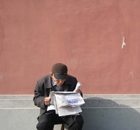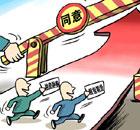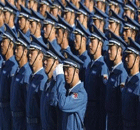About Vancouver
Vancouver counts the cost of high Olympics security
(Agencies)
Updated: 2010-02-08 14:23
 |
Large Medium Small |
VANCOUVER, Feb 5 (Reuters Life!) - The threat of a terror attack on the Vancouver Olympics is considered low but Canada is still spending far more to protect the event than it did to build the venues where athletes will compete.
Airport-style screening for spectators at venues, divers patrolling the harbour and hundreds of police from across the country are all part of one of the most extensive security operations in Canadian history.
Some critics wonder if the primary target of the vast net is not potential international terrorists but rather potential local protesters angry that public money is going to the Olympics and not into social services.
"As I speak to you today, there is no specific threat against the Olympics," Michel Cote, a spokesman for the Integrated Security Unit told reporters this week in a briefing on spectator screening procedures ahead of the Feb. 12-28 Games.
U.S. Homeland Security Secretary Janet Napolitano also says she is not aware of any special concerns about the Games. U.S. officials are working with Canada on Games security because of Vancouver's proximity to the border.
The Canadian government has budgeted C$900 million ($852.3 million) for security, compared to the C$580 million spent to build and upgrade the venues where athletes will compete in Vancouver and in the mountain resort of Whistler.
The Vancouver Organizing Committee's operating budget for the Games, not including security, is C$1.7 billion.
Some 15,000 police, soldiers and private security guards will be deployed and will sleep and eat in three rented cruise ships.
MUNICH ATTACK
Security officials say their plans for protecting the 17-day Games, and the Paralympics in March, were developed assuming a moderate threat level so that operations could be ramped up at a moment's notice if an incident happened.
Officials bristle at suggestions that the security spending might be excessive.
"I wonder if that is what Munich said in 1972," Royal Canadian Mounted Police assistant commissioner Bud Mercer, who heads Olympic security, snapped at a Reuters reporter when the budget was unveiled last February.
The attack on Israeli athletes at the 1972 Games was the deadliest such incident in modern Olympic history. Eleven Israeli team members died after being taken hostage by Palestinian gunmen.
In Canada, police were in an impossible position, said Andre Gerolymatos, who has studied terrorism issues and monitored preparations for the 2010 Games at Simon Fraser University near Vancouver.
"If something happens (C$900 million) wasn't enough. If nothing happens, it was too much. They are damned if they do, damned if they don't," Gerolymatos said.
Gerolymatos thinks the biggest threat is not a large organised group such as al Qaeda, but an individual working alone, similar to the bombing in a park at the 1996 Summer Games in Atlanta which killed one person and injured more than a hundred.
LEGAL OBSERVERS
Some Olympic critics feel they are the real target of the security net. Leaders of the Olympic Resistance Network accuse police of harassing them in a bid to gain information on potential protests during the Games.
There were occasional disruptions at Olympic-related events while Vancouver was preparing for the Games, and during the cross-country relay bringing the Olympic torch to the city for the Feb. 12 opening ceremonies.
Security officials deny the harassment allegations and say they have an obligation to prepare for the possibility that peaceful protests could turn violent.
The British Columbia Civil Liberties Association will use a team of volunteer legal observers to monitor for rights violations during any conflicts between police and Olympics opponents.
"They (security officials) seem to be spending a lot of time on a group of people who hold open meetings," said David Eby, the association's executive director, adding that he worried that such an approach might have distracted police from other threats.
Privacy groups are also worried that many of the more than 1,000 security cameras set up to monitor the boundaries of venues and public gathering areas will not be taken down after the Games as officials have promised.
Spectators heading to watch the events have been warned not to take anything they would not carry on to an aircraft because the security screening will be the same.
There will be entertainment outside venues to ease any ill-feelings about the delays. Screening at some venues will start three hours before the event to handle the expected crowds. (Editing by Clare Fallon)







